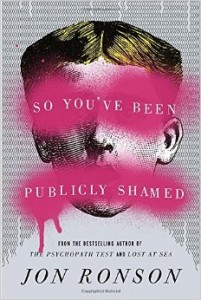 I preordered this book a while ago, and by the time it was delivered I was having second thoughts. I’d seen so many articles about it and excerpts from it that I wondered if there was anything left to be gained from reading the book itself… after reading it I can say there was both more and less in it than I’d expected.
I preordered this book a while ago, and by the time it was delivered I was having second thoughts. I’d seen so many articles about it and excerpts from it that I wondered if there was anything left to be gained from reading the book itself… after reading it I can say there was both more and less in it than I’d expected.
Ronson’s exploration of public shaming romps through a wide variety of groups, from porn tapings to rehabilitation centers. He meets real criminals, people whose sex lives have become tabloid fodder, and characters we are familiar with – and probably should not be familiar with – from twitter pile-ons. Some of the most interesting stuff I’ve seen in articles about the book is not in the book itself, making it read like volume 1.
Basically, Ronson’s message is that when we participate in casual shaming we are part of a monster that can destroy people for minor infractions of unwritten rules – mob justice. Relatively early in the book his focus shifts to what allows the shamed to recover or to go through the experience unscathed, and here is where he begins to really depress me. Almost all the approaches he investigates, from support groups to vigorous self-defense to being shameless to being cautious forever after to paying thousands of dollars for image management services, let the shaming episode take over the person’s life for years after the folks who enjoyed the twitter storm have forgotten all about it, just as Ronson has forgotten the names of people he shamed before writing this book.
There’s another approach he touches on briefly – the Right to be Forgotten. In the US, this seems to face insuperable free speech challenges, and how can somebody be forgotten on an international internet when not all countries recognize their right to delete information?
Then there’s the burn-it-down approach, which involves destroying the standard that people use to shame you. After all, the effectiveness of a pile-on depends on somebody taking the accusations seriously. Look at tabloids’ exposures of sex scandals. Why did some victims lose their jobs or commit suicide, while others went blithely on their way under the burden of public knowledge? Ronson thinks it’s largely because society as a whole decided ‘who cares?’ about other people’s sex lives. While this isn’t as universal as he makes it sound, it’s true that a lot of sexual behavior that would have been tremendously shaming in the past can be faced down nowadays. Most of the vocal proponents of shaming on twitter would themselves be ashamed to not be sex-positive, or to criticize people’s kinks.
What favorite accusation will be defanged next? Will ‘racist’ and ‘sexist’ go the way of ‘pervert?’ And when they do, will we just have reassorted ourselves into the same social groupings, with the same power dynamics, that we had before the internet gave everyone a voice?
This book didn’t present much hope of fighting the monster, short of burning down the standards it invokes, but the book’s very limitations got my mind buzzing about other approaches. Because when people recognize that a monster is out there and as prone to eat them as their enemies, things do start to happen and life gets interesting.
For instance, it made me wonder about internet insurance. How many organizations have long-standing contracts with internet reputation managers? Do their insurance policies cover this potential emergency expense? Are their employees also covered? Given the uncontrollable nature of twitter storms, will they come to be viewed the way actual storms are, and online reputation damage be ranked with having a tree fall on your car?
Will employees ever be in a position to demand clauses in their contract protecting them against discrimination based on twitter storms? Pile-ons, after all, provide an excuse for firing people; the Salaita case comes to mind. What are the ramifications for employment law? Will desirable employees begin to shun companies that fire on the basis of social media, as they now are presumed to shun companies that discriminate against GLBT employees? Will searching someone’s twitter feed become as unacceptable a part of job interviews as asking them about their sexual orientation?
So many questions, so many issues. Thirty seconds’ googling brought up a mess of NLRB guidelines and a whole new batch of legal blogs I’ll be following. But I would have liked to get at least some of this information from the book about it.








